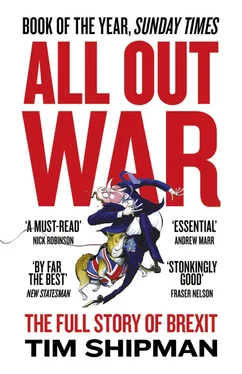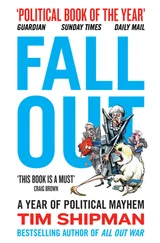Whenever there is an election, people ask me who I would like to win. I have a stock answer, which is only partially facetious: ‘My contacts – anyone who answers the phone.’ In general elections your mates can theoretically all win their seats. But the EU referendum was a civil war. I had close friends on both sides. At least one journalist with a loved one on a campaign was banished from the marital bed as a result of something they wrote. By the end of it people I like and admire were looking for work. Others whose careers had been unfairly coasting were returning in glory. The public rarely considers the human cost that accompanies a political realignment. The referendum campaign represented a career-life-or-death situation for many involved. Yet under levels of sleep deprivation that would be regarded as torture if they were inflicted on an enemy combatant, they remained professional and helpful. To everyone who answered the phone, if I could vote for you all, I would.
Most of all I would like to thank my family. My parents raised me in a house of books and have always supported me unconditionally. My sister Hannah has been a rock and a wizard webmistress, despite sharing a nuclear family with a thermonuclear ego. My wife Charlotte makes everything complete, and has endured more absences than any spouse has a right to expect during this project. Memories of our wedding mean that the day this book was first published was only the second proudest of my life.
Tim Shipman
Camogli, Todi, San Niccolo and Blackheath,
May 2017
1973
Ted Heath takes Britain into the EEC, or ‘Common Market’
1975
British public backs EEC membership in referendum with 67 per cent voting to stay
2007
Sep – David Cameron gives a ‘cast-iron guarantee’ to hold a referendum on the Lisbon Treaty if he becomes PM
2009
Jun – Ukip demands a referendum and finishes second in the European elections with 16.5 per cent of the vote
Nov – Cameron rules out a referendum because the Lisbon Treaty has been ratified
2011
Oct – Largest post-war parliamentary rebellion on Europe as eighty-one Tories defy a three-line whip to back an in/out referendum on British membership
Dec – Cameron ‘vetoes’ EU fiscal compact treaty. Other twenty-six EU member states agree their own deal
2013
23 Jan – Cameron makes Bloomberg speech, promising to get ‘fundamental reform’ and then call an in/out referendum
5 Jul – James Wharton brings forward Private Member’s Bill to enshrine referendum pledge in law
2014
15 Mar – In article for the Sunday Telegraph , Cameron outlines seven areas where he wants reform of the EU
22 May – Ukip wins European elections with 26.6 per cent of the vote
28 Aug – Douglas Carswell defects from Tories to Ukip
27 Sep – Mark Reckless becomes second defector to Ukip
28 Nov – Cameron lays out demands for a four-year ban on in-work benefits for EU migrants. He ditches plans for an emergency brake on numbers
2015
7 May – General election. Cameron wins first Tory majority since 1992 and vows to hold a referendum before the end of 2017
8 May – Nigel Farage resigns as Ukip leader after failing to win South Thanet, but returns three days later
6 Jun – Steve Baker and David Campbell Bannerman launch Conservatives for Britain
25 Jun – Cameron outlines his broad-brush proposals at EU summit
9 Sep – Tory rebels and Labour MPs unite to defeat government over purdah rules
25 Sep – Nigel Farage announces Ukip will back Arron Banks’s group Leave.EU, originally called ‘The Know’
9 Oct – Vote Leave is officially launched with a video highlighting the £350 million-a-week cost of EU membership
12 Oct – Britain Stronger In Europe launches with Stuart Rose as chairman
9 Nov – Vote Leave activists disrupt Cameron’s speech to the CBI
10 Nov – In a letter to Donald Tusk, Cameron sets out details of the ‘four baskets’ of reforms. In a speech to Chatham House he details plans for a sovereignty lock demanded by Boris Johnson
1 Dec – Alan Johnson launches Labour In For Britain
6 Dec – Vote Leave calls Cameron ‘toxic’ after he claims he will have to campaign to leave if he is ignored by Brussels
8 Dec – MPs overturn an attempt by Labour peers to lower the voting age to sixteen
17–18 Dec – European Council discusses Cameron’s demands and agrees to push for a deal in February
2016
4 Jan – Cameron agrees that ministers will be allowed to campaign for Leave after Chris Grayling and Theresa Villiers threaten to resign
25 Jan – ‘Coup’ attempt to oust Cummings is repelled when other Vote Leave staff threaten to quit
2 Feb – Donald Tusk publishes draft agreement of a ‘new settlement’ between the EU and the UK
3 Feb – Steve Baker says the deal is ‘polishing poo’
18–19 Feb – Cameron secures a new deal in Brussels, including an emergency brake on migrant benefits. George Galloway attends a Grassroots Out rally in Westminster
20 Feb – Cameron holds historic Saturday cabinet meeting. Michael Gove leads a ‘gang of six’ cabinet ministers to back Brexit
21 Feb – Boris Johnson announces that he too will campaign to leave
22 Feb – In a statement to Parliament Cameron says, ‘I have no other agenda than what is best for our country,’ which is widely interpreted as an attack on Johnson’s motives
12 Mar – ITV does a deal with Downing Street and Ukip to secure Cameron and Farage for a debate
15 Mar – Cameron accuses Johnson of ‘literally making it up’ for suggesting the UK should have a Canada-style trade deal with the EU
18 Mar – Iain Duncan Smith resigns as work and pensions secretary over cuts to disability benefits in the budget
31 Mar – Vote Leave submits its designation document to the Electoral Commission with just twenty minutes to go
13 Apr – Electoral Commission designates Vote Leave and Britain Stronger In Europe as the two official campaigns
18 Apr – First Treasury document claims Brexit will cost families £4,300 a year
22 Apr – On a visit to London, President Barack Obama says Britain will be ‘in the back of the queue’ for a trade deal with the US
26 Apr – During a crunch meeting in George Osborne’s office, Tory chiefs on Stronger In rule out ‘blue-on-blue’ attacks on Johnson and Gove or any moves to tackle the immigration issue
5 May – In local elections Labour suffers the worst result by an opposition since 1982
6 May – Farage visits Vote Leave to discuss the ground campaign and the debates
8 May – Michael Gove tells the BBC’s Andrew Marr that Brexit Britain would be outside the European single market
9 May – Cameron warns that Brexit could lead to war in Europe
15 May – Boris Johnson says the EU is pursuing the same superstate as Hitler, using ‘different methods’
17 May – The Sun splashes on sex smears against Boris Johnson’s wife. Michael Heseltine condemns Johnson’s ‘preposterous’ claims
19 May – Eurosceptic rebels force Cameron to accept amendment to the Queen’s Speech on transatlantic trade deal
21 May – Osborne claims house prices will be 18 per cent lower in the event of Brexit
25 May – Ryan Coetzee reports to Stronger In chiefs that the economic message is not working
26 May – Immigration figures are released showing net migration to the UK rose to 333,000 in 2015
27 May – Purdah period begins, preventing the government from publishing further pro-Remain documents. Downing Street staff move to Stronger In HQ
29 May – Gove and Johnson write to Cameron accusing him of ‘corroding public trust’ with his immigration pledges. Andrew Bridgen says Cameron is ‘finished’ as PM
Читать дальше












